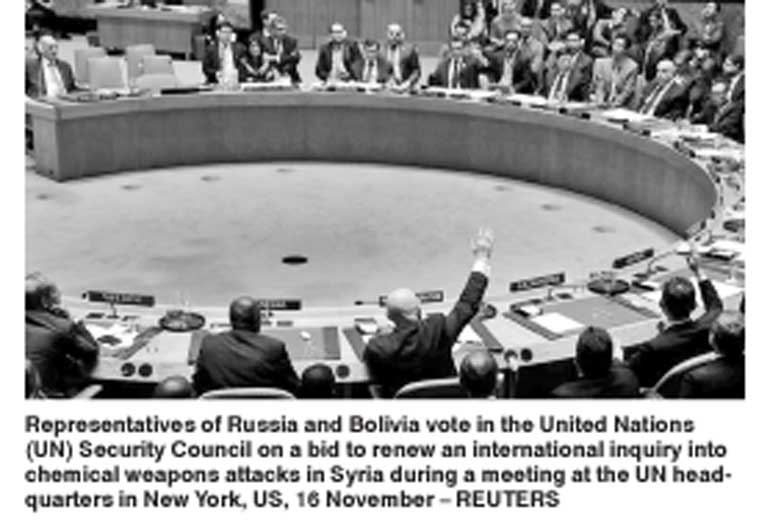Thursday Feb 19, 2026
Thursday Feb 19, 2026
Saturday, 18 November 2017 00:00 - - {{hitsCtrl.values.hits}}
 UNITED NATIONS (Reuters): Russia on Thursday cast its 10th veto of United Nations Security Council action on Syria since the war began in 2011, blocking a US-drafted resolution to renew an international inquiry into who is to blame for chemical weapons attacks in Syria.
UNITED NATIONS (Reuters): Russia on Thursday cast its 10th veto of United Nations Security Council action on Syria since the war began in 2011, blocking a US-drafted resolution to renew an international inquiry into who is to blame for chemical weapons attacks in Syria.
The mandate for the joint inquiry by the U.N. and the Organization for the Prohibition of Chemical Weapons (OPCW), which found the Syrian government used the banned nerve agent sarin in an April 4 attack, expires on Friday.
A resolution needs nine votes in favor and no vetoes by the United States, France, Russia, Britain or China to be adopted. The US draft text received 11 votes in favour, while Russia and Bolivia voted against it and China and Egypt abstained.
The vote sparked a war of words between Russia and the United States in the council, just hours after White House spokeswoman Sarah Sanders said President Donald Trump believed he could work with Russian President Vladimir Putin on issues like Syria.
The April 4 sarin attack on Khan Sheikhoun that killed dozens of people prompted the United States to launch missiles on a Syrian air base. US Ambassador to the United Nations Nikki Haley warned after the council vote on Thursday: “We will do it again if we must.”
Russian UN Ambassador Vassily Nebenzia said the US draft resolution was not balanced. “We need a robust, professional mechanism that will help to prevent the proliferation of the threat of chemical terrorism in the region and you need a puppet-like structure to manipulate public opinion,” Nebenzia said.
Syrian ally Russia withdrew its own rival draft resolution to renew the inquiry, known as the Joint Investigative Mechanism (JIM), after unsuccessfully pushing for its proposal to be considered second and not first, as council rules required.
However, following the vote on the US draft, Bolivia then requested a vote on the Russian text. It failed, receiving only four votes in favour, seven against and four abstentions.
Nebenzia said he was “deeply disappointed” and that those who voted against the Russian draft “bear the full brunt of responsibility for the cessation of operation of the JIM.”
After the meeting ended Japan circulated a draft resolution to roll over the mandate for the inquiry for one month, diplomats said. It was not immediately clear when the council could vote.
Ahead of the council votes on Thursday, Trump urged the Security Council in a Twitter post to renew the inquiry, saying it was needed to prevent Assad from using chemical weapons.
While Russia agreed to the 2015 creation of the JIM, it has consistently questioned its findings, which also concluded that the Syrian government used chlorine as a weapon several times.
Russia has now vetoed 10 resolutions on Syria, including blocking an initial US bid on Oct. 24 to renew the JIM, saying it wanted to wait for the release two days later of the inquiry’s report that said the Syrian government used sarin.
“Russia has killed the Joint Investigative Mechanism,” Haley said. “In effect Russia accepts the use of chemical weapons in Syria. How then can we trust Russia’s support for supposed peace in Syria?”
Syria agreed to destroy its chemical weapons in 2013 under a deal brokered by Russia and the United States.
“We condemn the use of chemical weapons by anyone,” Nebenzia said.
Iraqi forces recapture last Islamic State-held town
BAGHDAD (Reuters) - Iraqi forces captured the border town of Rawa, the last remaining town under Islamic State control, on Friday, signalling the complete defeat of the group’s self-proclaimed caliphate.
The capture of the town marks the end of Islamic State’s era of territorial rule over a so-called caliphate that it proclaimed in 2014 across vast swathes of Iraq and Syria.
Iraqi forces “liberated Rawa entirely, and raised the Iraqi flag over its buildings,” Lieutenant General Abdul Ameer Rasheed Yarallah said in a statement from the Joint Operations Command.
Rawa borders Syria, whose army declared victory over the militants on Nov. 9, after seizing the last substantial town on the border with Iraq.
“With the liberation of Rawa we can say all the areas in which Daesh is present have been liberated,” a military spokesman said, referring to Islamic State by an Arabic acronym.
Iraqi forces will now focus on routing militants who fled into the desert and exert control over Iraq’s borders, he said.